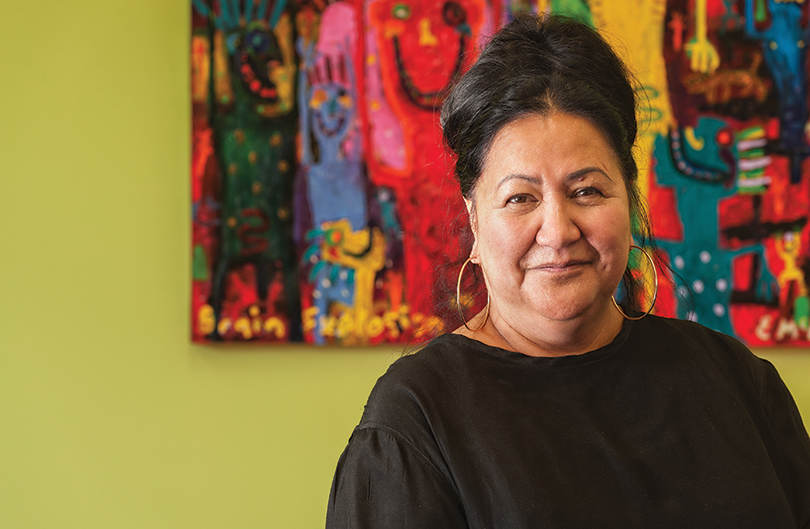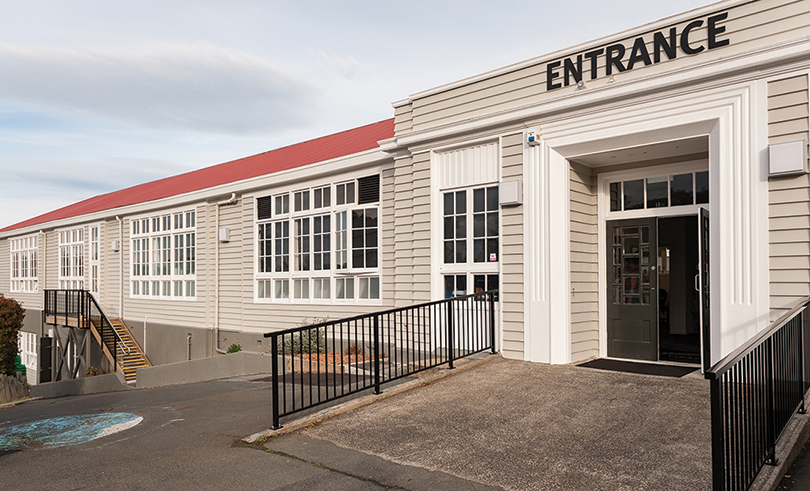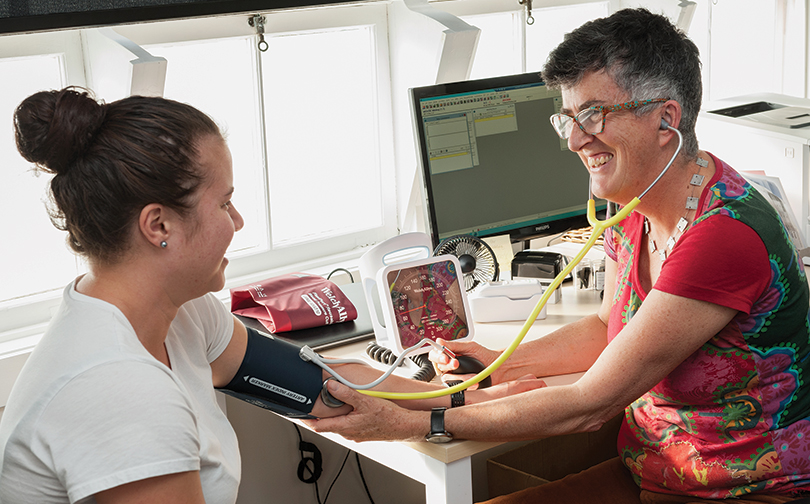Te Kāika
Jul 1, 2018

Earlier this year, a long-awaited health hub opened its doors in South Dunedin. Te Kāika – “The Village” – intends to remain true to its name by creating a community of collaborative and affordable health and social services for Māori, Pasifika, and low-income whānau
Kaituhi Rob Tipa catches up with co-founder Donna Matahaere-Atariki to discuss how a lifelong passion for social change led to the creation of Te Kāika.

When Donna Matahaere-Atariki (Ngāi Tahu, Ngāti Ruanui, Ngā Rauru, Te Ātiawa) was growing up in rural Southland, she was told she had “ideas above her station in life”.
Donna says that professional assessment was absolutely right. Rather than taking offence at a cultural slap in the face, she has used it as motivation to carve a career path as a powerhouse for social change.
“I don’t think anyone would call me humble,” she says frankly. “I think I have a really strong sense of justice. I’ve never actually lost a sense of what’s right for people.
“When you grow up knowing you’re a second-class citizen and everyone treats you like one, there’s a part of you that takes that on board, and your expectations are lower,” she says. “You don’t expect a good deal off anybody, which makes it more difficult to make your own good deal.
“I want Māori to have ideas above their station in life, and, for that to happen, they first have to have their fundamental entitlements met, and then they are able to grow.
“I think that’s one of our biggest struggles and that’s why it’s taking so long.”
Donna’s wide-ranging service to Māori and the health sector was recognised earlier this year when she was made a Member of the New Zealand Order of Merit (MNZM).
Her first reaction to receiving the award was whakamā, mild embarrassment perhaps, at being singled out for her work; which she regards as building relationships with a network of people to bring about social change for Māori.
Despite her very public profile, Donna values her privacy dearly. She prefers to work in the background rather than the limelight, but her social conscience and natural talent for leadership frequently catapult her into the front lines.
What drives her is a strong, ingrained sense of social justice and equity that compels her to raise her head above the parapet, standing up for the rights of disadvantaged people or communities.
Donna’s life has been an extraordinary journey from high school truant to university graduate, lecturer, author, and champion of disadvantaged Māori, especially children, in the education, health, and social welfare systems.
She has witnessed first-hand huge inequities for Māori, who she believes are simply missing out on their basic rights. Rather than accepting their lot, she encourages others to believe in themselves and aim for the stars – just as she has.
After entering the workforce at age 15, Donna returned to education in her early 20s and completed a master’s degree in the Philosophy of Feminist Theories at Massey University. After working for her iwi, she moved into the public health sector as a policy director for the Ministry of Māori Development (Te Puni Kōkiri), and eventually as a contractor to a range of government agencies.
She is the author of many publications covering Treaty of Waitangi issues, whānau development, and the education needs of Māori children.
Donna is a former education manager at the Ngāi Tahu Develop-ment Corporation and a former chief executive of the Ngāi Tahu subsidiary, He Oranga Pounamu.
Currently she chairs Te Rūnanga o Ōtākou, and is executive director of Arai Te Uru Whare Hauora. She is also a ministerially appointed member of the University of Otago Council, as well as a raft of other local and national roles too numerous to list here.
Among her most important achievements is that of being the co-founder of the multi-million dollar community healthcare hub Te Kāika, which opened in the Ōtepoti suburb of Caversham in February.
The idea of creating a free or affordable health service for Dunedin’s most vulnerable residents was first floated over a cup of coffee four years ago with Albie Laurence, a medical student from Kiribati and former manager of Pacific Trust Otago, which helps Pacific Dunedin people to access health, education and social services.
Donna says the climate for change must have been right, because the simple seed of an idea rapidly gathered momentum into what she describes as “the perfect storm.”

Above: The exterior of the former College Street School, now home to a thriving community health hub.
The College Street School in Caversham had been closed for several years. It was run down, and starting to become a target for vandalism. Donna approached the Ministry of Education to ask if it would consider leasing the building.
At the same time, she and Laurence put together a business case for start-up funding from Te Pūtahitanga o Te Waipounamu, the South Island Whānau Ora funding agency.
Just before Christmas 2015, the pair received two letters on the same day. One was from the Ministry of Education, approving a seven-year lease of the College Street School site at a nominal rental of $1 a year. The other was from Te Pūtahitanga o Te Waipounamu, granting them $500,000 to start drawing up plans for Te Kāika.
Te Kāika already employs three doctors, four nurses, and a dental clinic staffed by final-year dentistry students from the University of Otago. It also offers physiotherapy, rehabilitation, and social services; along with a gymnasium and teaching spaces.
Without any marketing or recruitment, Te Kāika signed up 900 patients in its first month of operation, and now has more than 2000 patients on its books.
The pair set up the charitable trust Ōtākou Health Ltd to receive the funds, and approached Professor Peter Crampton, the Pro-Vice-Chancellor of Health Sciences at the University of Otago, to become the establishment chair.
As Donna explains, support for the project came flooding in from all directions and they never struck any real obstacles at any stage.
“We didn’t get any money from the government or taxpayer to do this,” she says. “I was more interested in getting their goodwill than their money.
“No-one put up any barriers. What I struck was a lack of belief. I dealt with good, old-fashioned cynicism more than anything. People didn’t really put obstacles in front of me, because they didn’t think it would happen.”
Initially the founders needed the support of three key partnerships. Arai Te Uru Whare Hauora, the University of Otago, and Te Rūnanga o Ōtākou invested $150,000 each to set the ball rolling.
After a meeting with Te Rūnanga o Ngāi Tahu CEO Arihia Bennett, the iwi provided technical support around aspects of resource consents, and in project-managing the renovations and rebuild of the College Street School at a budgeted cost of $1.7 million.
Earlier this year Te Kāika opened as a state-of-the-art health hub offering affordable health care for low-income residents of South Dunedin.
Te Kāika already employs three doctors, four nurses, and a dental clinic staffed by final-year dentistry students from the University of Otago. It also offers physiotherapy, rehabilitation, and social services; along with a gymnasium and teaching spaces.
Without any marketing or recruitment, Te Kāika signed up 900 patients in its first month of operation, and now has more than 2000 patients on its books.

Above: Te Kāika GP Dr Lucy O’Hagan with a patient.
To qualify for very low-cost access funding, half its clients have to be Māori or Pacific Islanders. Currently, 60 per cent fit this requirement, so the hub is free to accept anyone else.
“The service is for everybody, not just Māori or Pacific Islanders,” Donna says. “We welcome anyone. I’m not into building ghettos.”
Because the business is run as a charity rather than as a privately-owned general practice, it can use its profits to subsidise its fees. It is about to introduce $10 fees for a doctor’s visit for all patients.
Sustainability of the business model is an important consideration, she says.
Two of Ōtākou Health Ltd’s partners – Arai Te Uru Whare Hauora and the University of Otago – lease space for their offices and dental clinic. In the future, Dunedin-based Te Rūnanga o Ngāi Tahu staff will have offices here.
All three tenants have signed up for long-term leases, giving Ōtākou Health Ltd. income for further development of the site. The trust expects to employ 50 staff within five years.
The College Street site has a colourful history as the first ever market garden in Dunedin, a city originally settled by immigrants from the Free Church of Scotland in 1848. The old school hall was also the first school gymnasium in the country.
Donna’s vision is for Te Kāika to become the village hub, a friendly environment with landscaped gardens for people “to hang out”, build relationships, and help build community; with positive flow-on effects for the nearby Caversham shopping centre.
As for the future, she is already looking ahead.
“I’m never happy. I have other ideas, but I can’t talk about them yet,” she says.
“The biggest barrier, if there is one, has always been the fragmentation of health funding, particularly health providers fragmenting and setting up in competition to each other.”
However, Donna says even with this happening, Te Kāika will continue to thrive.
“I’m very focused on sustainability,” she says. “The thing I do feel comfortable with is if government continues to fragment funding, we’ll be in good stead.
“The beauty about being outside the public sector is that we can make decisions really quickly, sometimes over the phone.”
Any future obstacles will be decisively dealt with, for the sake of continuing to serve the community.
“If a barrier is put in front of me, my first reaction is, ‘How can I go under it, around it, or over it?’” Donna says.
At a glance: Māori Health Profile 2015 for the Southern District Health Board region (Otago and Southland)
44% of Māori in this region reside in the four most deprived areas
By 2020, the Māori population over the age of 65 will have increased by 54%
Māori are admitted to hospital with heart failure twice as often as non-Māori
Māori are admitted to hospital 45% more often than non-Māori
Only 60% of Māori women receive breast cancer screening compared to 75% of non-Māori women
Only 73% of Māori women receive cervical cancer screening compared to 95% of non-Māori women
Māori are 30% more likely to be admitted to hospital with a mental health disorder than non-Māori
These statistics represent just a few of the health and well-being challenges that have been facing Māori families for decades. For the last 20 years, iwi have been trying to hold the Crown and other services to account; but Donna believes it is time to become more proactive.
“The data for Māori health is sobering,” she says. “But the driver for Te Kāika is not about ameliorating years of deprivation produced by others. It is about mana motuhake.”